2019/2020 ANNUAL REPORT
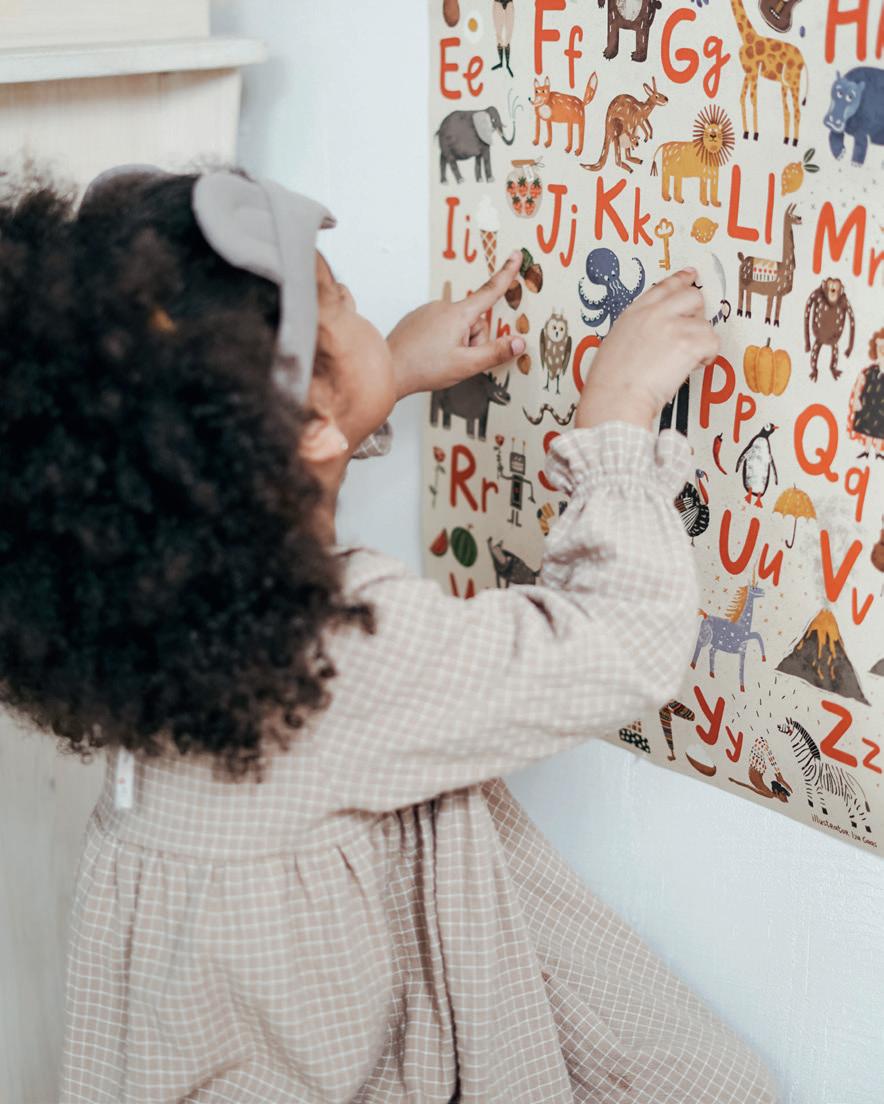
The International Bureau for Children’s Rights (IBCR) is a Canadian nongovernmental organisation that has been upholding the rights of the child for 25 years in 45 countries across Africa, the Americas, Asia, and the Middle East.
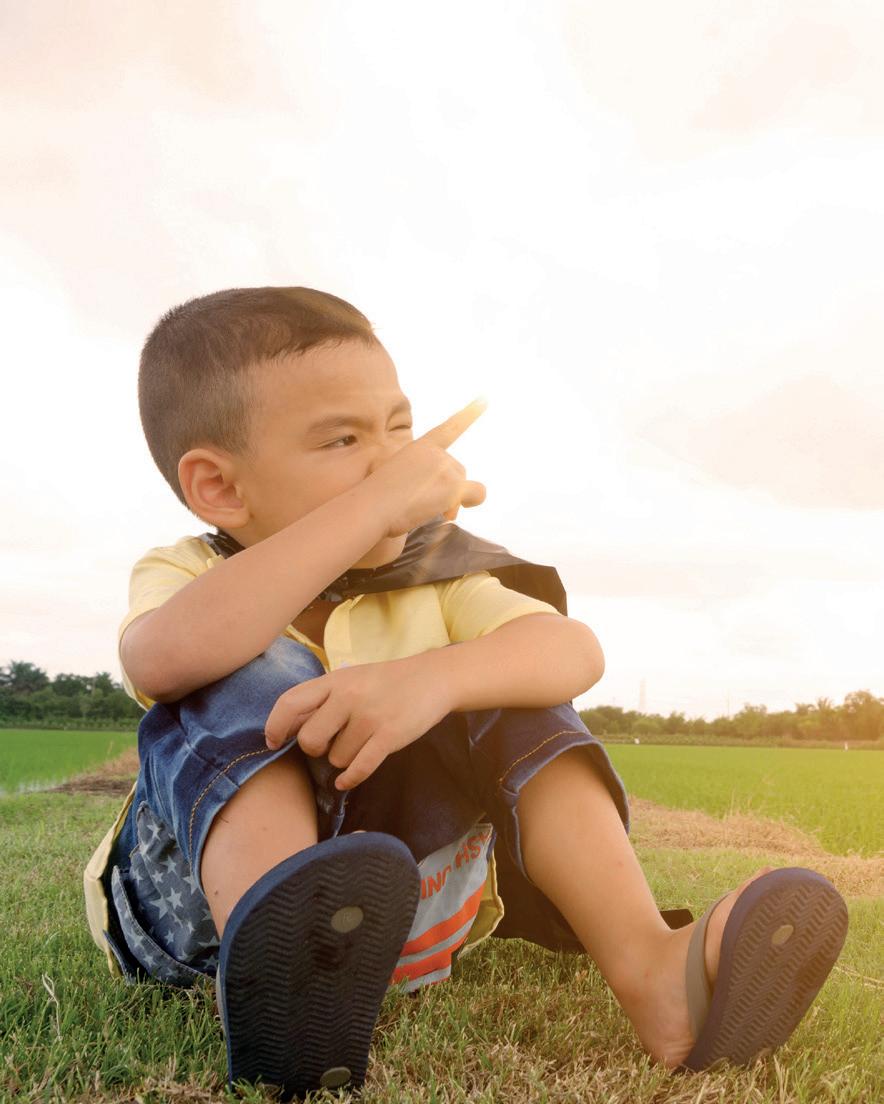 © Pexels / Porapak Apichodilok
Cover © Pexels / Cottonbro
© Pexels / Porapak Apichodilok
Cover © Pexels / Cottonbro
FIELDS OF ACTIVITY

Children and justice
VISION
A world in which every child, boy or girl, enjoys rights equally and in all circumstances.
Children and emergency situations
Combating child exploitation and violence
MISSIONS
LISTEN to local partners and work with them to develop innovative solutions that are respectful of children’s rights and based on existing processes
STRENGTHEN the capacities of frontline community actors to address issues affecting children
PROMOTE active participation from all stakeholders, including children
FOSTER collaboration between the various professionals involved in child protection
SUPPORT and CHAMPION reforms, action plans and legislation in favour of children’s rights
FUNDAMENTAL PRINCIPLES
› Take the child’s best interest into account
› Non-discrimination
› The right to life, survival and development
› Ensuring respect for children’s right to participation and freedom of expression
The IBCR at a glance
4 OFFICES worldwide 25 YEARS OF OPERATIONS
Approximately 40 PERMANENT EMPLOYEES
45 COUNTRIES REACHED by our actions
More than 2.9 MILLION CHILDREN ARE BETTER PROTECTED thanks to our actions
More than 4,370 CHILDREN HAVE BEEN CONSULTED through our projects
More than 61,200 PROFESSIONALS have received CHILD-RIGHTS TRAINING through our projects
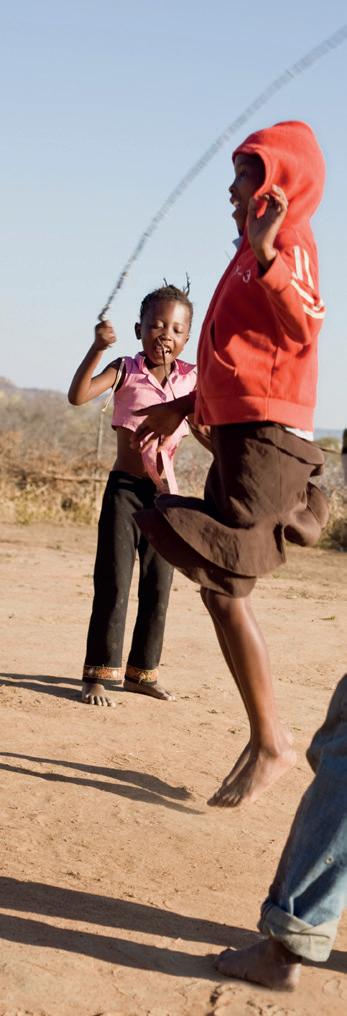
4 • 2019/2020 • IBCR ANNUAL REPORT
© 123RF / Lucian Coman
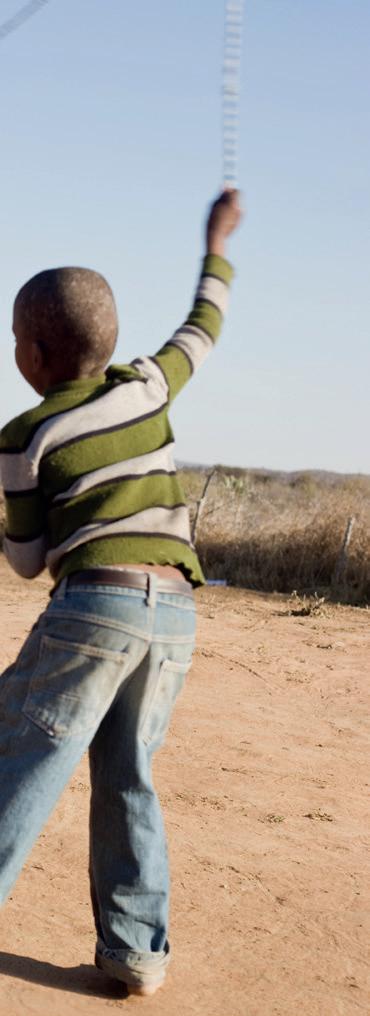
2019/2020 • IBCR ANNUAL REPORT • 5 Table of contents A symbolic year for children’s rights Measurable achievements of this year Convention on the Rights of the Child: 30 years later Defending children’s rights on all fronts Thee IBCR’s reach and impact Our projects around the world Our multi-year initiatives around the world Voluntary cooperation, as close as possible to the communities Financial information Our valued partners Our team 6 9 10 30 16 23 26 40 50 52 54
A symbolic year for children’s rights

2019was a milestone year for the International Bureau for Children’s Rights (IBCR), as the organisation celebrated its 25th anniversary, and for children’s rights more broadly because it marked 30-year anniversary of the signing of the Convention on the Rights of the Child.
This international treaty, which was adopted on 20th November, 1989, completely transformed the way in which children are regarded. Whereas children were previously considered objects of law, this document enabled them to become full subjects of law, occupying a central role and benefiting from special protections and rights. The Convention was universally recognised and today is the world’s most ratified human rights treaty.
30 years have passed since the landmark text was penned and there are many reasons to celebrate, as many indicators point to an overall improvement in the situation of children around the world. However, even though greater international awareness of children’s rights has led to major strides, much remains to be done. Today, children suffer from more insidious forms of violence than before, with many being affected by humanitarian crises, armed conflict, displacement and natural disasters. Minors continue to be trafficked, exploited, abused and deprived of liberty. It’s unacceptable.
6 • 2019/2020 • IBCR ANNUAL REPORT
© 123RF / Rawpixel
Children’s protection must be made a priority all over the world, so that better responses can be provided when child rights are compromised.
Over the past 25 years, the IBCR has taken action in 45 countries, provided training to more than 61,000 professionals, and helped improve protection systems for nearly 3 million children across all continents. By working directly with the people who protect and promote children’s rights on the ground, the IBCR helps ensure that the needs and best interests of girls and boys are a central consideration in all interventions and decisions involving minors.
At the time of writing, the COVID-19 pandemic has disrupted daily life, offering a sober reminder that any progress in the area of children’s rights can easily be lost. Stretched to their limits by the health crisis, juvenile protection systems are being forced to adapt more than ever before. Our interventions are all the more necessary as the climate of instability is expected to prevail for a long time yet.
We are all responsible for protecting and advocating for children’s rights. Over the past year, many of you participated in our activities, offering valuable support in numerous different ways. The IBCR’s work is made possible by your commitment, combined with the dedication of our employees and volunteers, and we are infinitely grateful for it.
Thank you to all of you, let’s continue to build a fairer world for children together.
Guillaume Landry, Director General
 Théophane Nikyèma, President of the board
Théophane Nikyèma, President of the board


2019/2020 • IBCR ANNUAL REPORT • 7
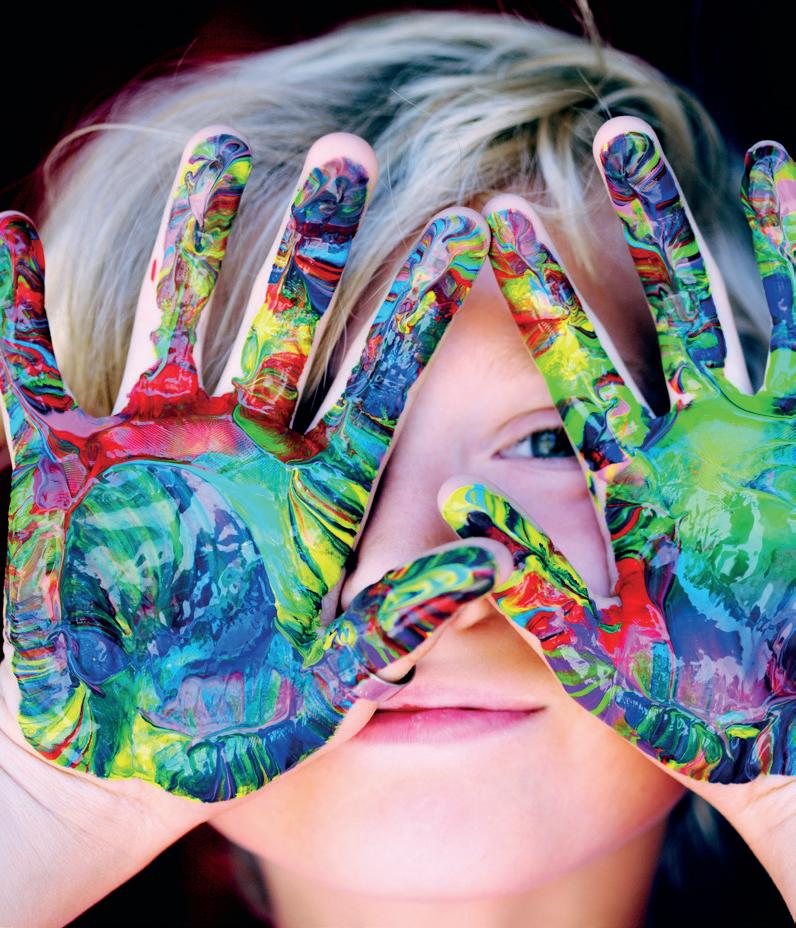
8 • 2019/2020 • IBCR ANNUAL REPORT
© Pexels / Sharon McCutcheon
Measurable achievements of this year
Mandates in 12 countries
in Africa, Asia, the Americas and the Middle East
541,444 children
benefited directly or indirectly from our work
1,196 women and 377 girls
benefited from our projects
5,343 individuals received child-rights information or training
41 employees, 34 interns and 9 volunteers actively contributed to our projects We held more than 75 awarenessbuilding workshops, professional development courses and training sessions on children’s rights, gender equality and child protection in armed conflict
8 measures promoting children’s rights were adopted in our target countries*

* including: a national budget reform with considerations for gender and children’s rights and two directives formalising the use of our practical guides by key professions in Burkina Faso, a ministerial order regulating child protection procedures, roles and responsibilities in the social work sector in the Democratic Republic of the Congo
1 bill proposing more favourable conditions for foster families was developed in Morocco with the help of the IBCR volunteer so that vulnerable children can enjoy better protection and grow up in a family home
2019/2020 • IBCR ANNUAL REPORT • 9
Convention on the Rights of the Child: 30 years later
On 20th November 1989, world leaders made a historic commitment to children by adopting the United Nations Convention on the Rights of the Child and formally undertaking to protect and uphold children’s rights.
Three decades later, how much progress has been made?
Our societies are now better equipped to promote and defend the rights of girls and boys. More robust laws, strategies and measures have been implemented to prevent and address violations of their rights.
Today, children are no longer afraid to speak up or speak out. They fight for their rights, for a life without discrimination or violence, for access to education, and for effective protection against global warming and digital exposure. They rightfully call for a childhood shaped by happiness, health and freedom. Today’s children can identify with some of their peers who have successfully delivered important messages on the world stage and positioned themselves as thought leaders.
Their message is clear: Children have the right to freedom of expression and it is our duty to take their opinions into consideration.
While a lot remains to be done, the collective awareness and mobilisation of children is undoubtedly the most noteworthy achievement of the past 30 years.
The IBCR is proud of this movement and committed to keeping the voices of children at the forefront of its actions for the decades to come.
Celebrating children’s rights around the world

20th November is World Children’s Day, but this year it’s also the 30th anniversary of the Convention on the Rights of the Child and the 25th anniversary of the IBCR. These are three good reasons to celebrate children’s rights around the world!
TAKING ACTION IN BURKINA FASO
The IBCR team in Burkina Faso participated in a 72hour event organised by Terre des hommes Switzer-
10 • 2019/2020 • IBCR ANNUAL REPORT
land to mark the 30th anniversary of the Convention on the Rights of the Child. Held in Ouagadougou, the event included presentations, information sessions and fun activities. Of course, children actively participated in the anniversary celebration. The IBCR had a colourful stand on site to promote its work in Burkina Faso, emphasise the importance of education and professions related to children’s services, and raise public awareness about the fact that everyone is responsible for protecting and upholding children’s rights.
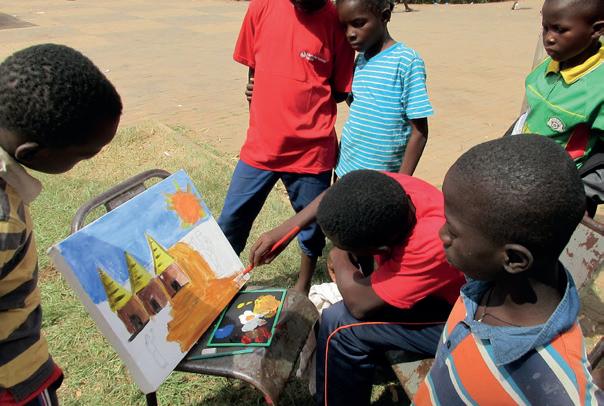
The IBCR was also present at an official ceremony held for the 30th anniversary of the Convention. Entitled “Thirty years of the CRC: New commitments for a child-friendly country,” the event was organised by the Ministry of Women, National Solidarity, Family and Humanitarian Action.

2019/2020 • IBCR ANNUAL REPORT • 11
u
Activity for the 72 hours of the 30th anniversary of the Convention on the Rights of the Child, Ouagadougou (Burkina Faso)
© Pexels / Daria Shevtsova
Two elementary schools, Sainte-Cécile in Montreal and Le Vivier in Ouagadougou, contributed to the celebration by collaborating on a joint project throughout the year. In doing so, the students reflected on the meaning of children’s rights in their daily lives. While the Burkinabe children highlighted the right to education and health in a video specially created for the project, their Quebec counterparts focused on environmental responsibility and impact.* It proved to be an interesting basis for a conversation on how the perception of children’s rights differs from one continent to another!
* The exchange was put on hold due to the COVID-19 health crisis and the related school closures introduced in March. We hope to relaunch it sometime during the 2020/2021 school year.
ROUND TABLE REVIEW IN CANADA
The IBCR took part in a round table discussion on “30 Years of Child Rights and the Unfinished Agenda: Protecting and Empowering Children in Situations of Conflict and Fragility.” Held in Ottawa, the event was organised by the International Child Protection Network of Canada and Global Affairs Canada, the federal agency responsible for diplomatic and consular relations.
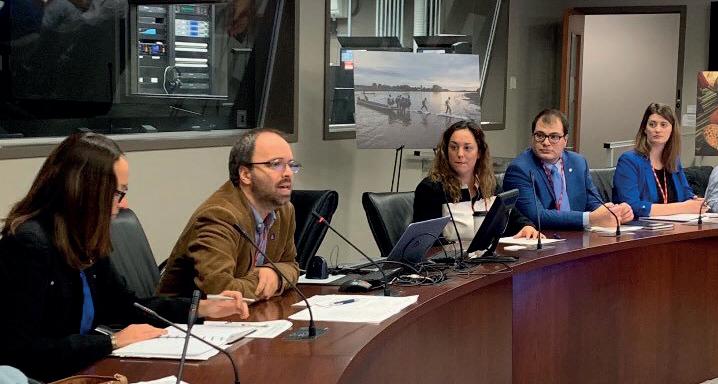
In conversation with organisations specialising in human rights and children’s rights, the IBCR shared its observations on the progress made in the 30 years since the Convention was drafted. Participants also discussed the fate of the most vulnerable children and opportunities for Canada to effectively fight for children’s rights.
30 YEARS OF CHILDREN’S RIGHTS: PROGRESS AND OBSTACLES
The IBCR organised a conference to examine the progress made in the 30 years since the ratification of the Convention on the Rights of the Child and to
Round table discussion, 20th November, 2019, Ottawa (Canada)
12 • 2019/2020 • IBCR ANNUAL REPORT
u
discuss the challenges that lie ahead. The meeting was attended by four internationally renowned child rights specialists, including Najat Maalla M’jid, the United Nations Special Representative of the Secretary-General on Violence against Children, who highlighted the importance given to children’s rights in the UN’s 2030 Agenda.
The participants, who numbered more than 60, had the chance to learn about the strides made in protecting children’s rights within institutions and in strengthening juvenile justice systems in Africa. It was also an opportunity to reflect on lessons learned from Europe’s migration crisis and child participation in the development of national laws and policies addressing violence against children.
Conference entitled “30 Years of Children’s Rights: Progress and Obstacles” at McGill University, Montreal (Canada)

FUNDRAISER FOR CHILDREN’S RIGHTS
The global celebrations culminated on 21st November with a children’s rights fundraiser organised by the IBCR in Montreal. More than 90 people attended the event, which included an art auction to raise funds for the IBCR and its projects.
Guests had the chance to view the numerous paintings donated by artists for the occasion, as well as an exhibit highlighting key moments in the history of children’s rights. The crowd was treated to a performance by painter Jessica Gorlicky and smooth jazz music by the talented Shaharah Sinclair in what was an evening dedicated to sharing ideas and raising awareness about various issues related to children’s rights.

2019/2020 • IBCR ANNUAL REPORT • 13
IBCR Benefit Night, Galerie 203, Montreal (Canada)
u
u
TIMELINE OF THE ADVANCEMENT OF CHILDREN’S RIGHTS
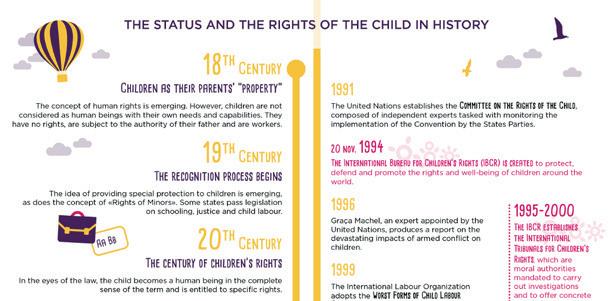
The status of children has changed significantly in the past several centuries. Whereas they were once considered the “property” of their parents, children are now full-fledged citizens who are entitled to defend their rights. Yet, much remains to be done in order for children to enjoy the full scope of their rights, equally and in all circumstances.
During this pivotal year, the IBCR developed a timeline that starts in the 19th century and continues through to today. The document illustrates the evolution of children’s recognised rights, indicating key dates in the struggle as well as the IBCR’s primary accomplishments.
A VIDEO GAME TO ENGAGE CHILDREN IN THE FIGHT FOR THEIR RIGHTS!
The IBCR developed a project for children with a video game that provides age-appropriate explanations of children’s rights. Even though new technologies are increasingly popular among youth, there are almost no digital tools on children’s rights available
u
Extract from the timeline (full document available on www.ibcr.org)
for this age group. Détective en mission pour les droits de l’enfant (Detective on a Mission for Children’s Rights) provides an explanation of the Convention on the Rights of the Child in terms that are suitable for children, who are, after all, the key group concerned by the treaty. Since child participation is a core value for the IBCR, the game was created for children, with input from children. Specifically, two classes from Sainte-Cécile and Saint-Fabien elementary schools in Montreal provided feedback throughout the game development process.
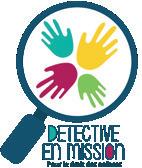
The video game was produced by students from Polytechnique Montreal and École Arts et Métiers ParisTech in France. It was unveiled to the public in June 2019. The main character, Detective Pinpin, is involved in a multi-level investigation, in which he confronts various incidences of common child-rights violations. Players hunt for clues to help them overcome obstacles, and they learn about their rights along the way.
Children were involved right through to the very end of the development process, which culminated with a stu-
14 • 2019/2020 • IBCR ANNUAL REPORT
dent radio show to present the game to the public. It included interviews, news stories on children’s rights, and testimonials from kids who participated in the project.
The game was designed for children aged 9 to 11, and is available online at no cost (see link below). It is currently available in French only, but will be translated into several other languages soon. The IBCR hopes to make the game available to French-language schools around the world and encourages educators to include the innovative tool in their curriculum.
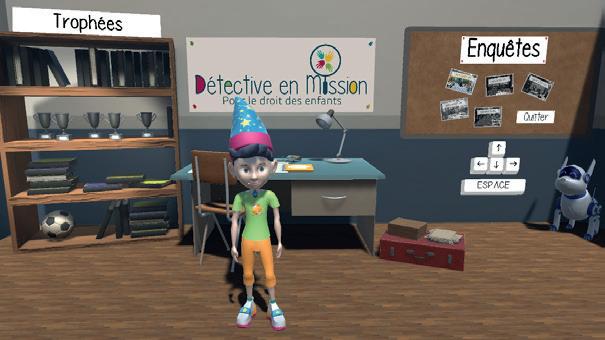
To play the video game: https://jeu.ibcr.org/
› More than 30 children provided input on the game
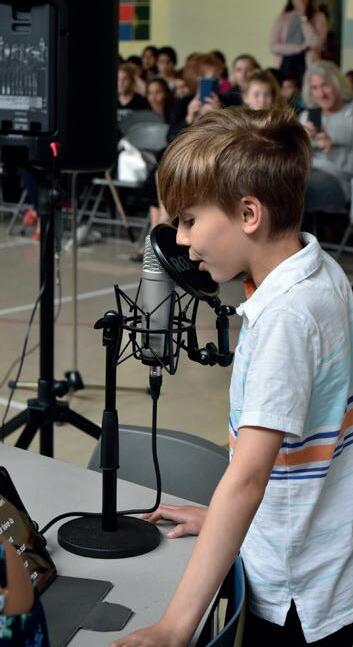
› 5 meetings were held to discuss children’s rights and test the game
› 7 students spent 6 months creating the game
2019/2020 • IBCR ANNUAL REPORT • 15
The video game interface, featuring the main character Detective Pinpin
u
An elementary school student hosts a radio show to launch the video game, Montreal (Canada)
u
Defending children’s rights on
all fronts
Renewed commitment to children in Quebec
ALL CHILDREN HAVE THE RIGHT TO RECEIVE HEALTHCARE, WITHOUT DISCRIMINATION
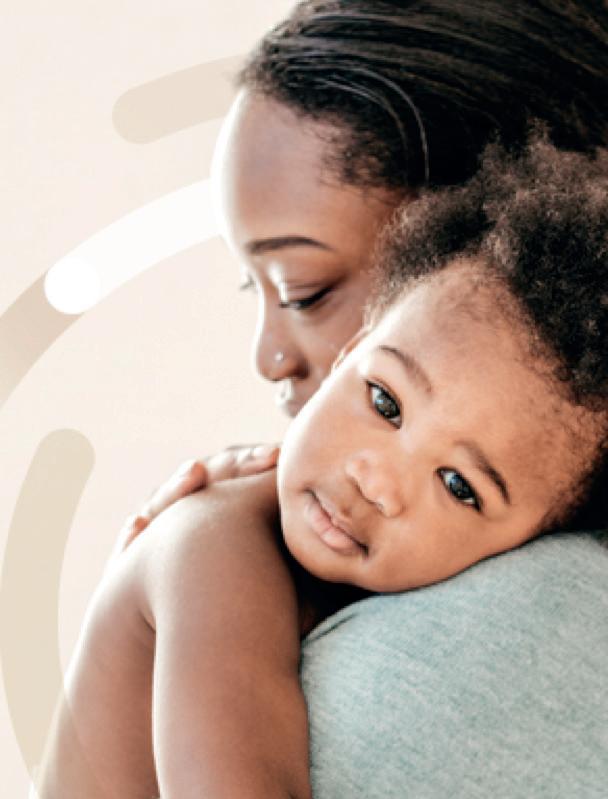
Once again this year, the IBCR provided support to the Observatoire des tout-petits which developed an awareness-building campaign about inequalities in access to healthcare and medical services among children in Quebec. By law, all Canadian children living in Quebec should have the same opportunities to achieve and maintain good health, and their parents’ immigration status shouldn’t be cause for discrimination. The IBCR added its voice to the demands for equal treatment of all children put forward by the Observatoire des tout-petits.
As human beings and full subjects of the law, children should be treated on an individual basis, independently of their parents’ status.
- Guillaume Landry, Director General, International Bureau for Children’s Rights
WITHOUT EXCEPTION, ALL PRE-SCHOOLERS DESERVE EQUAL OPPORTUNITIES TO SUCCEED
© Observatoire des tout-petits
During the 4th edition of Early Childhood Week, which took place from 17th to 23rd November, 2019, the IBCR co-signed an open letter calling for equal opportunities for all Canadian children. Among the issues raised in the letter were differences in access to quality education, healthcare, social services and safe public recreational spaces. Even though most Quebec pre-schoolers are faring well, they don’t all enjoy the same opportunities from birth to reach their full potential. That’s why the IBCR added its voice to the call to action launched by the Observatoire des tout-petits, joining other child-protection groups and Quebec personalities who believe that early childhood development should be made a top priority for society.
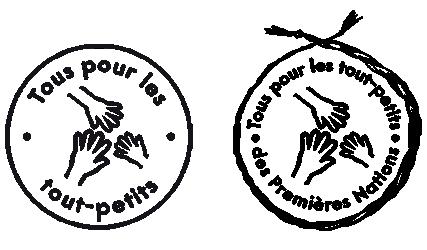
16 • 2019/2020 • IBCR ANNUAL REPORT
Advocating for a system that adapts to every child in Quebec

Participating in an exercise led by the Quebec government to strategise on juvenile protection, the IBCR presented recommendations for institutions in the province to change the way they view children. In particular, this involves more actively soliciting and taking into account the opinions of young people on issues that concern them. The IBCR shared this message through several initiatives. The first was an open
letter that was co-signed by Doctors Without Borders Canada and addressed to the Special Commission on Children’s Rights and Youth Protection.
Soon after, 16 child protection and welfare agencies joined forces at the initiative of the Bureau, and issued a united call for the procedures and approaches used within Quebec’s child protection system to be reviewed. The goal is for the system to adapt to children, and not vice versa. The collective, represented by the IBCR and Equitas – International Centre for Human Rights Education, presented and illustrated its recommendations to the Commission at an in-person meeting on 25th Februrary, 2020.
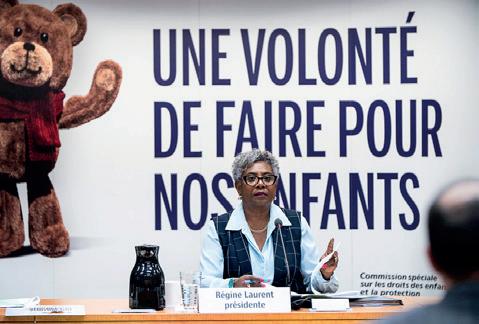
During the meeting, we stressed the need to take into account the trajectories of Quebec children
and involve them in decision making. We also called for more widespread and specialised knowledge on child rights in Quebec society, and the need for an independent body tasked with monitoring the province’s youth protection system, investigating child rights violations and taking action as needed.
[…] It is essential that children be involved in the creation of child protection policies and frameworks. If they are old enough to suffer from the errors, negligence or violence of adults, then they are strong enough to share their thoughts with us and have their voices heard.
- Excerpt from the letter sent to the Special Commission on Children’s Rights and Youth Protection in December 2019.
2019/2020 • IBCR ANNUAL REPORT • 17
© Josie Desmarais –Métro
© Observatoire des tout-petits
A forum for reporting on the state of children’s rights in Quebec
In 2020, Canada submitted a report to the United Nations on the implementation of the Convention on the Rights of the Child within its borders. As an extension
of this initiative, McGill University’s Faculty of Education held a forum to discuss the situation in Quebec and allow experts to share reliable information on children’s rights in the province. In discussions with child protection organisations and various academics, the IBCR spoke about violence against children, as well as on ethnocultural and religious minorities.
Training session on minimum standards of humanitarian action
In partnership with the Canadian Council for International Cooperation (now Cooperation Canada), the Bureau conducted a training course in March 2020 on the minimum standards for child protection in humanitarian action, based on the Charter created by the Sphere movement. 16 people from humanitarian
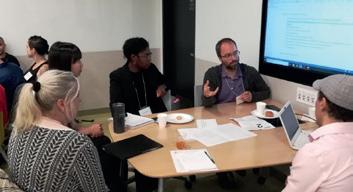
NEW EDITION OF THE MINIMUM STANDARDS FOR CHILD PROTECTION IN HUMANITARIAN ACTION
Created in 2012 by the Alliance for Child Protection in Humanitarian Action, the Minimum Standards for Child Protection in Humanitarian Action (CPMS) aim to establish common principles among all those involved in child protection and humanitarian action. After a two-year review process involving 1,900 people and 85 agencies, the new edition of the CMPS presents simplified content tailored to the current context. It reflects recent changes and compiles recent data from the sector. The IBCR collaborated with the Alliance on the creation of these standards, and specifically aided with the definition of a standard dedicated to justice for children in emergency situations (Standard 14, which is Standard 20 in the new version).
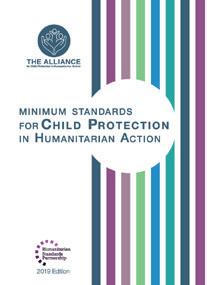
18 • 2019/2020 • IBCR ANNUAL REPORT
Cover of the 2019 edition of the CPMS © Alliance for Child Protection in Humanitarian Action u
Forum on children’s rights in Quebec, Montreal (Canada) u
aid and international development organisations were trained in the Sphere Handbook, an internationally recognised practical guide to humanitarian intervention.
Meeting with the Alliance for Child Protection in Humanitarian Action in Geneva
Every year, the Alliance for Child Protection in Humanitarian Action (the Alliance) holds meetings with various child protection organisations, agencies, academics, decision-makers and supporters to discuss the current state of child protection in humanitarian initiatives. The meetings also serve to forge connections between stakeholders. The IBCR was invited to present the competency-based approach that is the cornerstone of its interventions. The approach, which is based on the idea that all professionals who interact with children should have a shared set of fundamental competencies, has been used to strengthen the capacities of security, social-sector and justice personnel in several different countries since 2011.
Strengthening child protection in United Nations operations
Over the past year, budget cuts affecting UN peace operations have significantly impacted the quality of child protection measures. More specifically, the UN’s capacity to monitor, report and respond to grave violations was reduced, undermining the implementation of the Security Council’s programme on children and armed conflict.
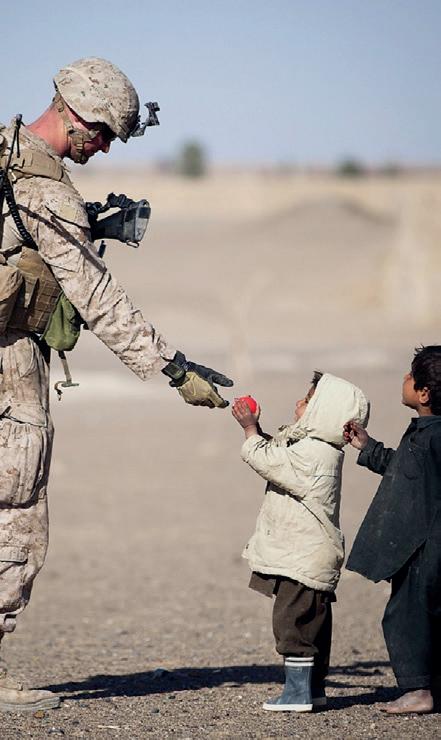
In response, the IBCR added its name to a campaign calling on UN Secretary General António Guterres to ensure sufficient human and financial resources are allocated to child protection in peacekeeping mis -
sions. The campaign included an open letter calling for the publication of a complete and accurate list of child rights violators, without distinction. It went further by demanding that these perpetrators only be delisted after a verification that they have upheld their commitments to protecting children’s rights.
2019/2020 • IBCR ANNUAL REPORT • 19
© Pixabay
IBCR BOARD CHAIR APPOINTED TO THE UN
In May 2019, Najat Maalla M’jid, who acted as the Chair of the IBCR’s Board of Directors since June 2016, was appointed as the United Nations’ Special Representative of the Secretary-General on Violence against Children. The IBCR warmly welcomes this new phase in her commitment to children’s rights.

Meeting with the UN on children’s rights in armed conflict
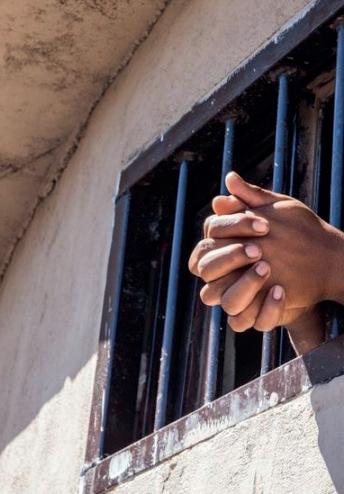
In 2005, the United Nations adopted Resolution 1612, which called for the creation of a mechanism for monitoring and reporting on violations of children’s rights. The aim was to keep the Security Council informed of the actual experiences of children in areas of armed conflict. Specialists outside the Security Council, known as “The Group of Friends of Resolution 1612,” meet regularly to discuss solutions for preventing violence and providing better protection to children affected by armed conflict.
At the invitation of Canada’s Permanent Mission to the United Nations, the IBCR travelled to New York on 15th August, 2019 to participate in one of these meetings, along with representatives of some 15 member states. The IBCR presented lessons learned on capacity-building for civilian, military and police personnel deployed in peace operations. It also covered the importance of making child protection a key topic in pre-departure training for these groups.
Based on its experience working with defence and security forces in some 30 countries, the IBCR emphasised the need to update training curricula to include greater focus on the key competencies required for peace missions, a change that would improve the impact of such operations.
20 • 2019/2020 • IBCR ANNUAL REPORT
The international community speaks out against the detention of children
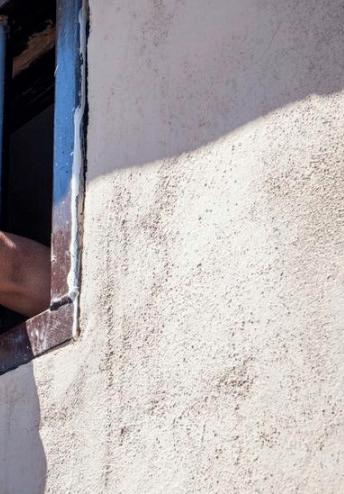
In October 2019, the United Nations published a study on children deprived of liberty. This prompted the IBCR to join a group of 170 non-governmental organisations in an international plea calling for a significant reduction in the number of detained and confined children worldwide.
Being deprived of liberty is detrimental to children’s mental and physical health. It is unacceptable. The IBCR is urging UN member states to implement the study’s recommendations, namely systemically collecting reliable data on children deprived of liberty and creating national action plans to reduce or end the detention of minors by opting for alternative measures. l
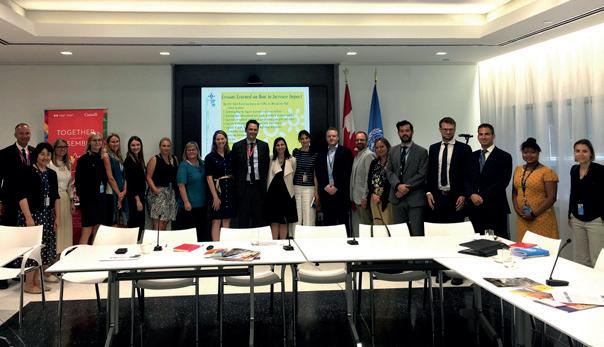
2019/2020 • IBCR ANNUAL REPORT • 21
u ©
Meeting of the Group of Friends of Resolution 1612, New York (USA)
NGO panel for the Global Study on Children Deprived of Liberty
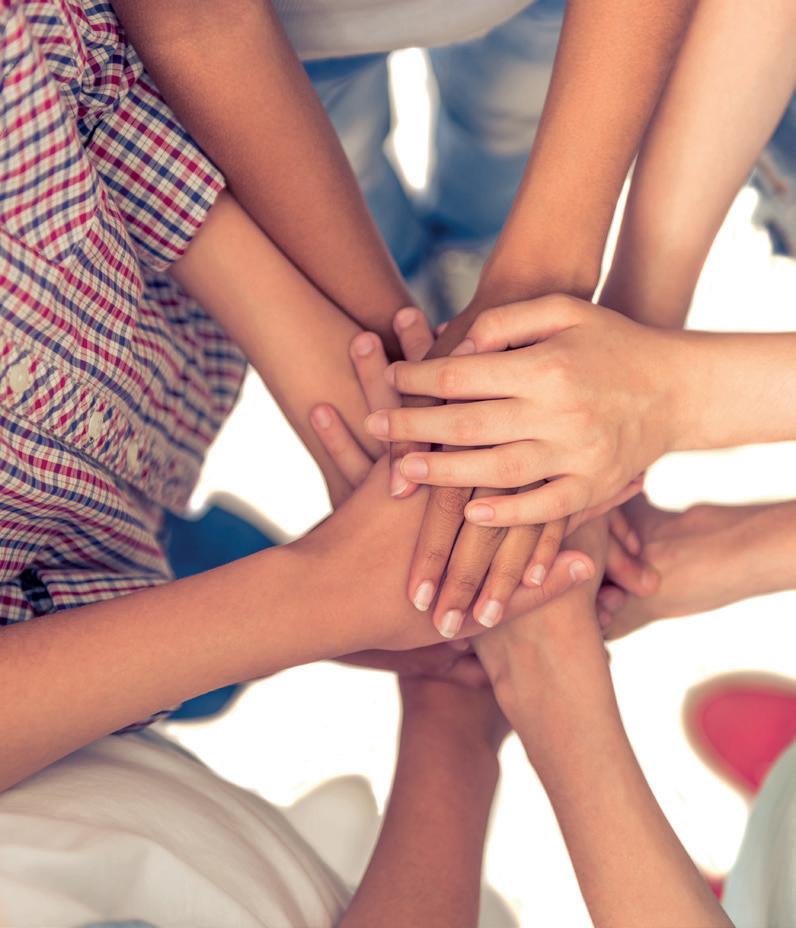
22 • 2019/2020 • IBCR ANNUAL REPORT
© 123RF / Georgerudy
The IBCR’s reach and impact
April 2019 to March 2020
127,966 website visits and 98,830 unique visitors
9,251 individuals subscribed to our newsletter and following our social media accounts
357 social media posts
seen 208,221 times, shared 494 times and generating 4,355 reactions
More than 30 topics addressed in our social media posts
38 posts on gender or gender equality on our social media accounts and website
5 events organised or co-organised
7 children’s rights events attended on 3 continents
More than 300 people attended the IBCR’s public events in Canada
14 child rights advocacy initiatives
30 media mentions about the IBCR and its projects in the organisation’s countries of intervention

2019/2020 • IBCR ANNUAL REPORT • 23
Students learn about child protection
On 11th February, more than 30 students from a broad range of fields attended an IBCR conference on how to strengthen child protection systems at the University of Montreal. The presentation focused on lessons learned from the IBCR’s experience protecting children’s rights, and the ensuing discussions helped raise awareness in the academic community about child rights advocacy and protection.
Running for a good cause
Uncooperative weather didn’t stop 20 runners from showing their support for children’s rights. In fact, the wind and rain did little to dampen the IBCR team’s spirits. On 27th and 28th April, the group participated in the Scotia Bank charity challenge at Jean-Drapeau Park in Montreal.
By signing up for the children’s, 5 km, 10 km or 25 km events, they helped the IBCR reach its goal of raising $4,500. These funds have been used for volunteers joining
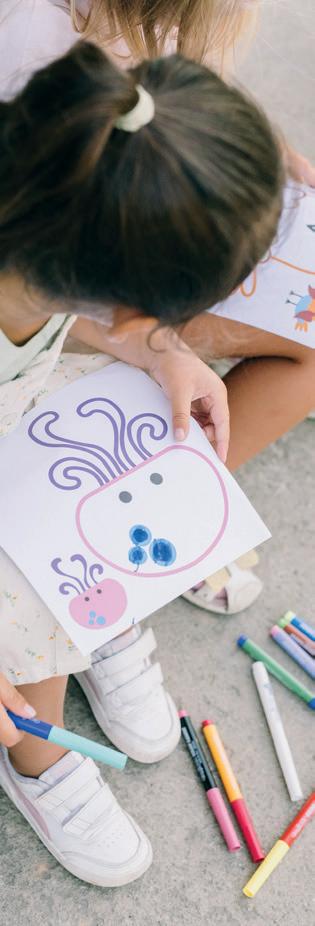
the final year of the PRODEF programme, an initiative supported by Global Affairs Canada.
Vues d’ailleurs : New perspectives gained through international volunteering
Hundreds of Canadian volunteers travel abroad every year to share their knowledge and skills with human rights organisations and associations around the world. And when they return, these volunteers typically become fervent ambassadors of international voluntary cooperation. Many qualify their experiences as impactful and formative eye-openers, and they invariably agree that such exchanges are important for protecting the rights of children and vulnerable groups.
The IBCR held various events throughout the year to highlight volunteer experiences and stories. These included lunch-and-learn and evening events such as round tables or Human Libraries, with past participants telling their stories and raising awareness in Canada about global child welfare issues. l
24 • 2019/2020 • IBCR ANNUAL REPORT
© Pexels / Olya Kobruseva

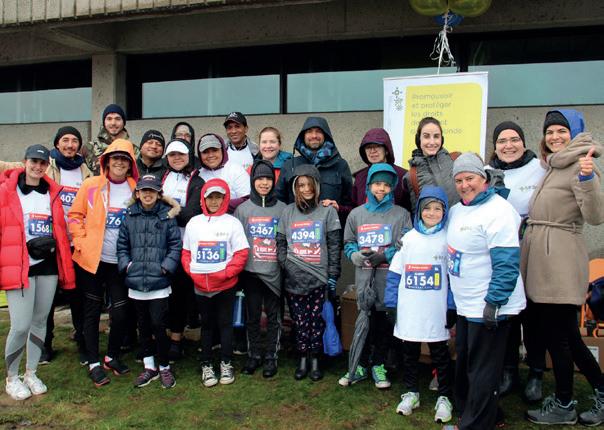
2019/2020 • IBCR ANNUAL REPORT • 25
The IBCR team at the 2019 Scotia Bank charity challenge, Montreal (Canada)
u
“Vues d’ailleurs” event held at the Centre for Sustainable Development, Montreal (Canada)
u
Our projects around the world

AFGHANISTAN
DEVELOPING A NATIONAL POLICY ON CHILD PROTECTION
After years of war, Afghanistan’s efforts to rebuild itself are ongoing and the situation of children’s rights in the country remains complex. Specifically, children’s right to age-appropriate protection of their physical and psychological wellbeing remains largely unrecognised at the family, community, and national levels. Consequently, Afghan children are at greater risk of being exposed to violence, abuse and exploitation.
522 persons consulted, including 198 children in 5 Afghan provinces
4 workshops held
258 professionals received training and tools to improve child protection
The IBCR was retained by UNICEF to provide capacity-building for Afghanistan’s Child Protection Secretariat and to support the Ministry of Labour and Social Affairs in the development of a national child protection policy. The policy had to allow for the application of existing laws on child rights protection, take into account the various issues affecting children’s rights in the country and consider the roles and responsibilities of the various actors involved in juvenile protection. To identify these factors, consultation workshops were held in five provinces. They were attended by more than 500 people, including children, their families, education specialists and religious leaders and government representatives.
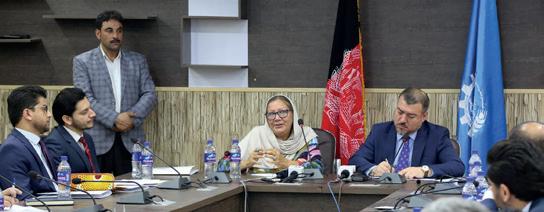 Press conference in Kabul (Afghanistan) © Afghanistan’s Ministry of Labour and Social Affairs
u
Press conference in Kabul (Afghanistan) © Afghanistan’s Ministry of Labour and Social Affairs
u
I will be happy when our country is developed, when kids go to school and can play in a safe environment.
- Child consulted during the project.
Better information management is also needed for improved decision-making and efficiency across the system for identifying, assessing and referring children in need of protective services. The IBCR therefore aimed to improve social work protocols for managing and tracking cases involving children. This was achieved by analysing available literature on the subject and reviewing the tools in use.
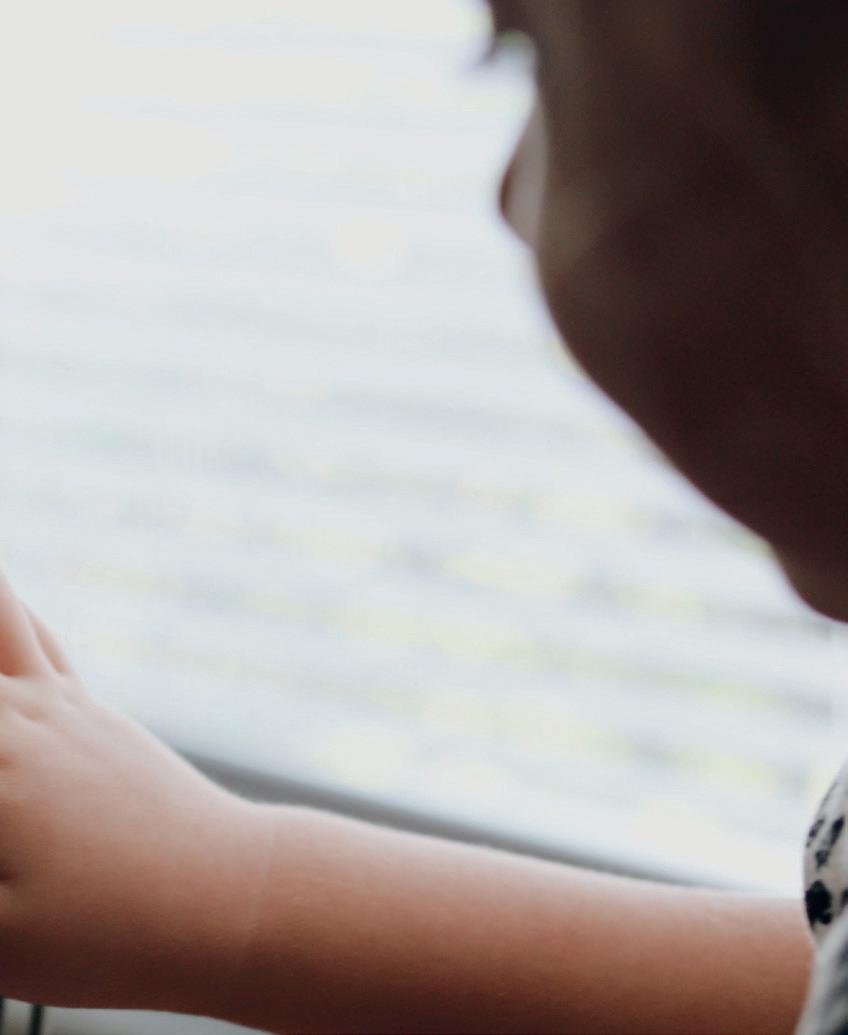
ANGOLA
PROTECTING CHILD VICTIMS OF VIOLENCE
Angola has ratified most international treaties relating to children’s rights and has developed effective child protection policies. In doing so, the country has demonstrated its determination to improve the situation of children. However, since these policies are often implemented inadequately, their impact remains limited.
Working with UNICEF, the IBCR helped strengthen Angola’s child protection system and improve coordination between the actors within it, so that all Angolan children can have access to
9 training sessions and workshops held
129 people received information or training on children’s rights
5 practical guides were created along with 5 courses on how to apply them
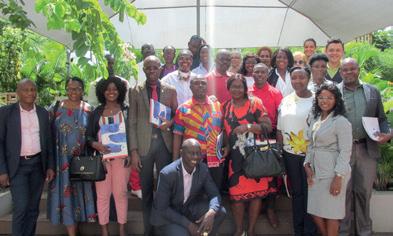
u
Multisector worshop, Lubango (Angola) u
child-friendly professional services. Practical guides establishing clear procedures and protocols for child protection, supervision and care were developed for the child protection system’s main sectors, including justice, security forces, and social, education and health services. These guides were designed to harmonise and coordinate practices at the national level. The IBCR also provided child-rights training to more than 120 professionals. They are now better equipped and able to share knowledge and skills with their peers.
The Government of Angola subsequently issued an executive decree, signed by all five involved ministries, aimed at disseminating the project’s recommendations, procedures and training throughout the country.

BURKINA FASO
A GENDER AND CHILD RIGHTS-SENSITIVE BUDGET
Earlier this year, Burkina Faso committed to setting up a pilot phase of gender and child rights-sensitive budgeting for six government ministries.* The decision was directly related to the IBCR’s work in the country.
In 2013, the IBCR conducted a study on child-friendly budgeting in Burkina Faso, in partnership with the German Agency for International Cooperation (GIZ), in order to better align the country’s budget with its political commitments. Meetings were held with several ministries, government departments and agencies, civil society organisations, and youth ages 17 to 19. Based on the findings of the study and workshops, a strategy was developed to ensure that children’s rights would be taken into greater consideration in the Ministry of Economy and Finance’s operations and budgetary cycles. We are seeing today the results of this strategy.
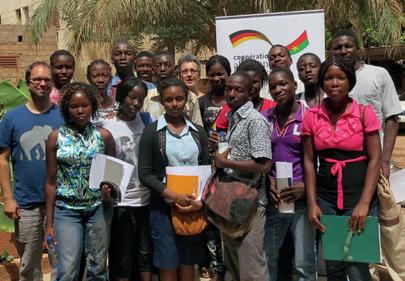 Study participants aged 17 to 19, Ouagadougou, Burkina Faso, 2013 u
Study participants aged 17 to 19, Ouagadougou, Burkina Faso, 2013 u
Subsequently, various funds and agencies implemented initiatives that paved the way for this pilot budgeting phase. With this new reform, Burkina Faso is reiterating its commitment to advancing gender equality and protecting children’s rights.
* The six ministries are: Economy, Finance and Development; Women, National Solidarity and Family; National Education and Literacy; Water and Sanitation; Agriculture and Irrigation Development; and Health.
CANADA
PROTECTING CHILDREN DURING PEACE MISSIONS

87 police officers took the training this year before leaving for Iraq, Haiti, Mali, Ukraine, the Democratic Republic of the Congo, Palestine and the International Criminal Court in the Netherlands
Every year, Canadian police officers are deployed to peace operations aimed at protecting people in countries experiencing conflict. The IBCR works with the Royal Canadian Mounted Police (RCMP) to provide these officers with training on child protection in emergency situations. The goal is to help them understand international standards and learn the mechanisms applicable in this field. The pre-departure training, which was developed in partnership with the RCMP and is facilitated by the IBCR, has been mandatory since 2017. Each participant also receives three pocket guides to support the training (see below).
NEW GUIDE FOR POLICE FORCES DEPLOYED IN PEACE OPERATIONS
This year, a third pocket guide was developed for personnel deployed on peace missions. It outlines the mechanisms for monitoring and reporting on grave violations committed against children in situations of armed conflict. The content complements the two other guides created by the IBCR: one on international standards for protecting children in emergency situations and the other on mechanisms for coordinating actors in the protection system.

Our multi-year initiatives around the world
Creating more child-friendly environments within Burkina Faso ’s social services, justice and security sectors
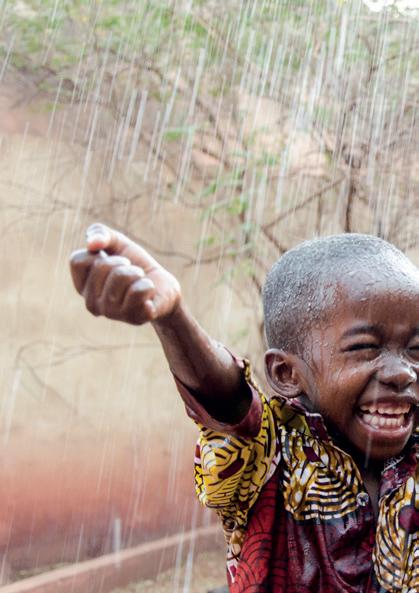
In 2015, the IBCR initiated a capacity-building project in Burkina Faso for professionals who work with children, in particular security forces, justice personnel and social workers. Significant progress has been made over the past 5 years and these institutions are now better prepared to protect and uphold the rights of the children they serve. One of the project goals is also to set up long-term actions that create a lasting positive impact on the lives of Burkinabe children. This project was made possible by Global Affairs Canada and involved close collaboration with the IBCR’s partners in the field.
Project funded by:
COMMON PRACTICES FOR ASSISTING CHILDREN IN CONFLICT WITH THE LAW
Children presumed to be in conflict with the law— namely those who are suspected, accused or convicted of a criminal offense—are entitled to receive support that takes into account their specific rights and needs. To ensure the professionals in contact with these children are familiar with their roles and
responsibilities, the IBCR this year produced and distributed 3 practical guides (referred to as “standard operating procedures”) intended respectively for security forces, social workers and prison guards. Initially, the project didn’t include plans to address prison guards, but their need for support emerged during meetings and workshops with local partners. These tools add to the practical guide for justice personnel created in 2018. Together, they define the entire trajectory for children presumed to be in conflict with the law, an exercise that had never been done before. The guides ensure that children receive clear, standardised treatment that is respectful of their rights at every step in their trajectory, from their initial contact with the justice system (arrest) to the investigation, detention or police custody (when applicable) and final decision on their case.
30 • 2019/2020 • IBCR ANNUAL REPORT
Workers have noticed a shift in their perspectives at work. They say their roles are clearer and better defined, and that their functions are explained more effectively in the standard operating procedures.
- Representative of the General Directorate for Family and Children

PROGRESS MADE THIS YEAR
l Our activities led to improved collaboration between the project’s target sectors as well as with various stakeholders involved in child protection (civil society, health services, families, etc.).

l Arrests are now made more discreetly and in a more respectful manner to prevent stigmatising children. For example, a child may be arrested by an officer in plainclothes. Violent actions against children are used less often and the presumption of innocence is applied more regularly and effectively.

2019/2020 • IBCR ANNUAL REPORT • 31
The standard operating procedure is distributed to justice personnel, Ouagadougou, Burkina Faso u
The practical guide is distributed to prison guards, Ouagadougou, Burkina Faso, October 2019 u
© 123RF / Riccardo Lennart Niels Mayer
l Social workers are now present in police stations and remand homes. They are assigned to cases involving children on a more regular basis.
l Children are increasingly being asked to share their views and they are given information about the legal process and their rights. This helps build trust between the children and the personnel who interact with them.
l There has been an improvement in the way statements from girl victims of gender-based violence are collected and processed. File confidentiality protected more effectively and processing times for cases of sexual violence have been reduced.
l The child’s gender is now taken into account at every step, resulting in certain adaptations to procedures for intaking and searching individuals, performing medical examinations and collecting statements. Efforts are made to ensure a staff member of the same sex as the child is present and that appropriate preventive, alternative or confidentiality measures are taken.
CHILD PROTECTION TRAINING FOR PROFESSIONALS
In order to effectively protect the rights of children, workers must first be aware of their rights and specific needs. This year, two new courses on children’s rights were added to the training programmes at the police academy, the national gendarmerie training centre and national school for prison guards. A total of eight institutions now offer courses developed as part of the IBCR project. By permanently including this material in their training programmes, they are ensuring that children’s rights and child-friendly practices are familiar concepts to professionals working with child perpetrators, victims and/or witnesses of crime. As a result, these professionals are more likely to take the specific needs of children into account and demonstrate more appropriate behaviours and attitudes when providing minors with assistance or protection.
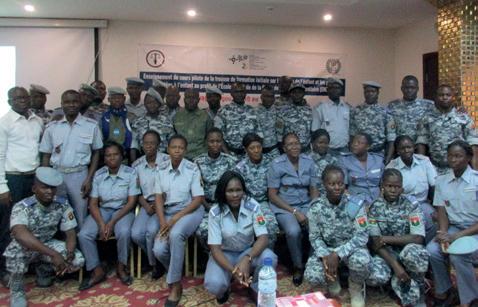
60 people, including 13 women, were certified to teach the two new courses this year
The standard operating procedures […] have resolved many ambiguities about what social workers do to help children. By providing plain-language explanations for people working in the social services field [...], the document is sure to contribute to their wellbeing.
- Social educator participating in workshops organised to distribute the standard operating procedures to social services personnel
32 • 2019/2020 • IBCR ANNUAL REPORT
Participants in the pilot training course for prison guards u
The course helped workers improve their knowledge, abilities and interpersonal skills. This will lead to better experiences for children in detention centres and ultimately foster their social reintegration.
ACHIEVEMENTS THIS YEAR
The rights of 501,550 Burkinabe girls and boys are now better respected and protected
2,295 people, including 189 women, received training on children’s rights and are now ready to apply this knowledge in their everyday work
7,734 professionals benefited indirectly from the IBCR’s activities and are now better prepared to protect children

I very much appreciated the training we received, including the material on child rights advocacy and gender. I also found the teaching method effective, which will make it easier to apply what we’ve learned in the field.
44 children, including 4 girls, participated in the development of the new tools
CHILD PROTECTION IS A SHARED RESPONSIBILITY
Another project goal was to raise awareness among the general public about the shared responsibility in safeguarding children’s rights. All members of society—from shopkeepers to judges, parents, teachers and peers—can take action to protect children from discrimination, violence and abuse. Everyone is capable of acting in the best interest of children. To get this point across, impactful messages were disseminated during the various activities and events organised this year.
2019/2020 • IBCR ANNUAL REPORT • 33
- Student who completed a course in the initial training for prison guards
- Social work student assigned to a new position after following training
Practical exercise during a pilot training course for prison guards u
Batela Mwana: Protecting children in the Democratic Republic of the Congo
Project funded by:
In all its projects, the IBCR aims to create lasting improvements to child protection. That’s why our teams work tirelessly to ensure that changes are implemented systemically and permanently. Since 2015, we have been working closely with institutions and partners in the Democratic Republic of the Congo to provide training and tools to police officers, justice personnel and social services workers. This year,
we made substantial progress in creating a safer and more child-friendly environment for Congolese girls and boys thanks to the willingness, conviction and involvement of the various project stakeholders.
This project has led to the development of various practical guides and training tools intended for professionals in the target groups. These resources aim to help them adapt their work practices and generate meaningful change, and a shift has already been noted in each of the project’s target sectors:
POLICE FORCE
Thanks to the project’s advocacy activities, gender issues are now a key concern for the national police force. The squads in charge of child protection and prevention of sexual violence have appointed
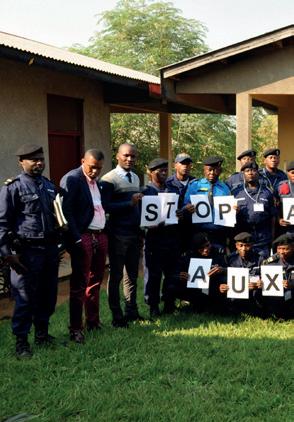
more women to senior positions and adopted gender-sensitive approaches in their work. In addition, police officers are now more sensitive to each child’s special characteristics and needs based on their gender and situation. For example, when children are interviewed, they can choose whether they would prefer to speak to a
2,948
34 • 2019/2020 • IBCR ANNUAL REPORT
ACHIEVEMENTS THIS YEAR
The rights of 14,740 girls and boys are now better respected and protected
737 people, including 257 women, received training on children’s rights and are now prepared to apply this knowledge in their everyday work
professionals benefited indirectly from the IBCR’s activities and are now better prepared to protect children
man or a woman. More consideration is now provided for their personal care needs and feminine hygiene products are now available for girls.

JUSTICE PERSONNEL
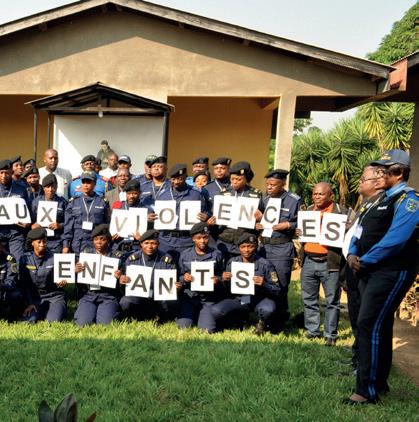
Approaches within the justice sector are becoming more child-friendly and justice system personnel are increasingly turning to educational measures to help children in contact with the law reintegrate into society and the community. Alleged juvenile offenders are now more likely to be treated in accordance with their rights and there is better coordination between the different actors in the judicial system. Case confidentiality is more effectively protected and children are more involved in decisions that affect them. Finally,
judges and social workers now enable children to make informed decisions by letting them know their options at each stage of the judicial process.
Since I had never read the CRC before, the four guiding principles were new to me. My work is based solely on the application of [these] principles, by always taking into account the child’s best interests, life and survival, by ensuring non-discrimination, and above all by involving children in decisions that concern them.
2019/2020 • IBCR ANNUAL REPORT • 35
Train-the-trainer event: Police officers take a stand against violence against children, MbanzaNgungu, DRC
u
© Pixabay / ThePixelman
- Jean Mfutila, President of the Peace Court in Tshela
SOCIAL WORKERS
The social workers involved in the project are now equipped to fully support children’s rights in their interventions. For example, while mediating between children and police or justice personnel during hearings and interviews, these social workers ensure that the rights of minors are respected. Moreover, they are actively working to reduce inequalities between Congolese girls and boys and to deconstruct negative gender-based preconceptions. As a result, attitudes are changing and prejudices are less prevalent in comments made by workers in the targeted sectors. Now that children are receiving better treatment, they are more trusting of the professionals responsible for their welfare.
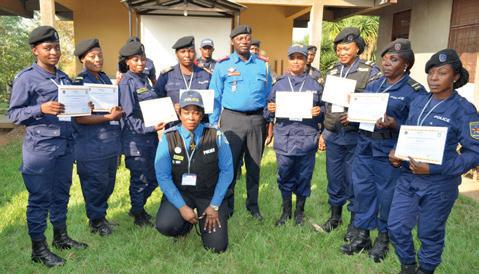

This standard operating procedure provided me with answers and highlighted the need to respect children’s rights. I’m now able to conduct quality social investigations, develop life plans and intervention plans.
FROM STANDARD OPERATING PROCEDURES TO LEGISLATION
This year, the Ministry of Social Affairs issued an order to clarify the procedures, roles and responsibilities applicable to child protection in the social services sector. These clarifications, which were inspired by the standard operating procedures developed by the IBCR and its field partners, have been included in the country’s legal framework. This decision is a testament to the project’s contribution to society and marks a shift in the way children will be treated going forward.
36 • 2019/2020 • IBCR ANNUAL REPORT
- Venantie Byenda, social worker in Goma
Workshop to distribute standard operating procedures to social workers, Kisangani, DRC
u
Police officers become certified child-rights trainers, MbanzaNgungu, DRC
Combating human trafficking in Honduras

Every month in Honduras, 14 people (most of who are between the ages of 14 and 16) fall victim to trafficking and exploitation*. These alarming figures demonstrate that human trafficking remains a persistent problem, despite the government’s efforts to improve its human rights record. This year, the IBCR made a commitment to support Honduran authorities in the fight against human trafficking, based on its experiences in Costa Rica and Canada. More specifically, the IBCR initiated a three-year capacity-building initiative for actors at the institutional and community levels. The goal is to improve their ability to protect the population, prevent trafficking, care for victims and prosecute perpetrators.
The project was made possible by support from the Government of Canada’s Anti-Crime Capacity Building Program.
WHAT IS HUMAN TRAFFICKING?
Human trafficking is defined as the recruitment, transportation, transfer, harbouring or receipt of persons, by means of the threat or use of force or other forms of coercion, of abduction, of fraud, of deception, of the abuse of power or of a position of vulnerability or of the giving or receiving of payments or benefits to achieve the consent of a person having control over another person, for the purpose of exploitation.
- Definition from the United Nations Convention against Transnational Organized Crime; Annex II: The Protocol to Prevent, Suppress and Punish Trafficking in Persons, Especially Women and Children
In 2019, the IBCR became a signatory of the Blue Heart Campaign, a global awareness raising initiative to fight human trafficking and its impact on society.
* Source: “Estudio de Conocimientos, Percepción e Identificación de Víctimas de Trata de Personas en Honduras,” (A Study of the Knowledge, Perception and Identification of Victims of Human Trafficking in Honduras), a study conducted jointly by Honduras’ Directorate for Children, Youth and Families, in partnership with the U.S. Agency for International Development (USAID) and the Inter-institutional Commission against Commercial Sexual Exploitation and Trafficking in Persons (CICESCT), 2019
2019/2020 • IBCR ANNUAL REPORT • 37
Signing the Blue Heart Campaign, Tela (Honduras)
As organisations representing the LGBT community, women and human rights advocates […] we know what human trafficking really is […] and what its various components are.
STRENGTHENING THE FIGHT AT ALL LEVELS OF SOCIETY
Effectively combating human trafficking requires a global effort that involves all levels of society, from state institutions to local organisations and community members. In order to stem the tide of violence, these actors must work together and distribute information, raise awareness and protect vulnerable populations. Over the next three years, the IBCR will be involved in strengthening capacities and improving collaboration within and between Honduran institutions involved in the fight. To do so, we will be working with our project partner, the Inter-institutional Commission against Commercial Sexual Exploitation and Trafficking in Persons (CICESCT), and its members, which include the Ministry of Labour, Attorney General’s Office, legal system, police forces, etc. Civil society and community groups will also be involved, including vulnerable populations such as children and youth, women, indigenous and Afro-descendent peoples and LGBTQI+ people. The aim is to help them better identify threats of trafficking and set up early warning mechanisms, as well as to encourage them to become more involved in institutional decisions at local and national levels.
KEY RESULTS FROM THE FIRST YEAR OF THE PROJECT
l Completed a situational assessment of the country’s anti-trafficking measures and prepared an inventory of the involved organisations
and structures through several consultation workshops
l Facilitated the signing of two collaboration agreements with the CICESCT and the Ministry of Labour and Social Affairs
l Selected four priority geographic areas: the departments of Cortés, Atlántida, Lempira and Francisco Morazán (Tegucigalpa)
GAINING A BETTER UNDERSTANDING OF THE SITUATION IN HONDURAS
For the project’s first year, the IBCR started by analysing the situation and legal framework in Honduras, and by surveying the key actors in the country’s fight against human trafficking. We held workshops and meetings with civil society organisations and groups in order to gain a better understanding their roles and actions in the areas of prevention, protection and prosecution. We will seek their continued participation throughout the project because no gains can be made without their mobilisation and commitment to the project’s initiatives.
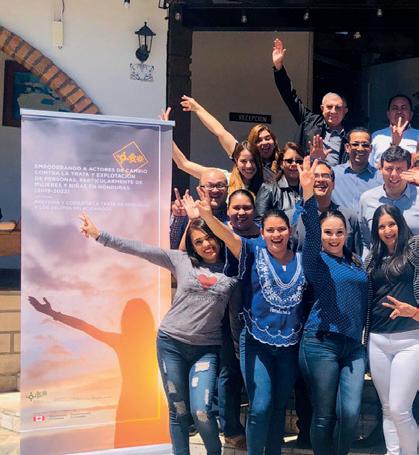
38 • 2019/2020 • IBCR ANNUAL REPORT
- Said López, general coordinator of SOMOS TRANS, the national platform of trans men and women of Honduras
14 vulnerable communities, 22 organisations and 29 institutions were consulted to help us gain a better understanding of the situation in Honduras
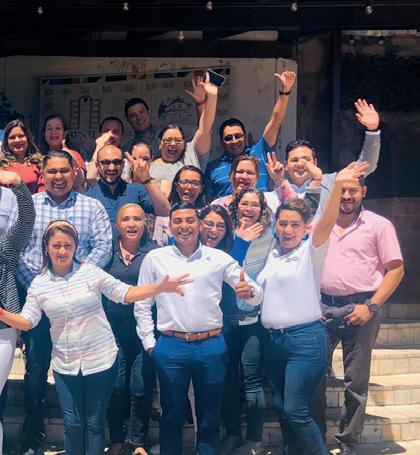
10 videos are being developed to highlight the views and interests of key groups, vulnerable communities and victims of human trafficking. These tools will be used in training courses for workers involved in anti-trafficking efforts (CICESCT, justice personnel, police officers and labour inspectors)
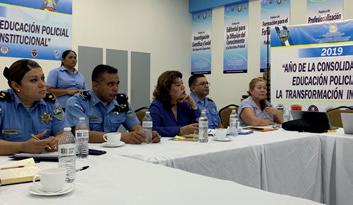
FOCUS ON GENDER
Trafficking affects people of all genders, but identifying the specific vulnerabilities of each gender is crucial to providing them with adequate protection. Girls and boys do not enjoy the same living conditions, access to quality services, or level of security or protection in their everyday lives. As a result, girls are more vulnerable. The IBCR will therefore apply a gender-sensitive approach in all project initiatives to ensure that national interventions are appropriate to the specific situation of women and girls. Specifically, the views, interests and needs of women and girls will be taken into account during the development of tools and training programmes.
It’s important for us to be included in this [project], and we hope to continue to work, fight for our rights and get the issue of trafficking under control. […] We need to work together in order to put up a stronger fight. The idea is to continue to be vigilant, to boost each other and to learn, in order to remain active.
2019/2020 • IBCR ANNUAL REPORT • 39
- Rosa Beatriz Cornejo Pineda, member of the environmental and indigenous movement of Santa Barbara and member of the project’s steering committee
Consultation with police officers, Tegucigalpa, Honduras
Workshop with the Ministry of Labour, Tegucigalpa, Honduras
Voluntary cooperation, as close as possible to the communities
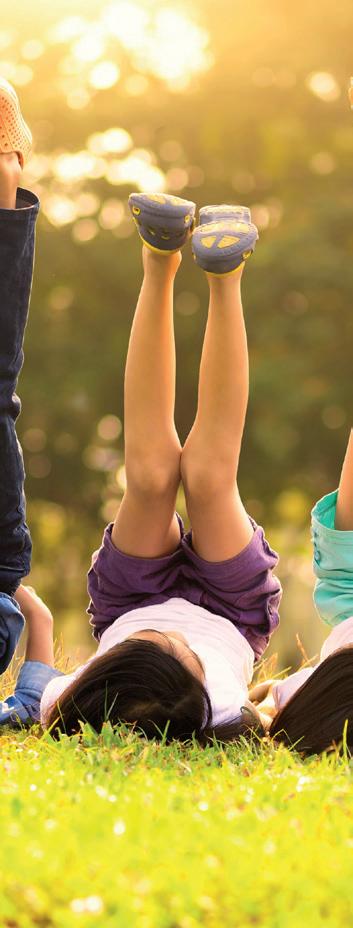
Final year of the PRODEF project, aiming to protect the rights of children, women and other vulnerable communities.
Since 2015, more than 70 Canadian volunteers have participated in the PRODEF (Protection of the Rights of Children, Women and Other Vulnerable Communities) project and contributed to its 110 mandates. Conducted as a joint initiative with Lawyers Without Borders Canada, the PRODEF project sent Canadian volunteers abroad to improve access to justice and human rights protections for children, women and vulnerable populations. Specialists were sent to nine countries to provide partner organisations with support in the form of capacity-building and assistance with legal affairs, social work, organisational management and communications.
PRODEF is the first project of its kind conducted by the IBCR. It has successfully addressed major development challenges—such as security issues, impunity and corruption, discrimination, gender-based violence, failure to respect children’s rights, and violence against girls and boys—in its target countries. The volunteers assisted local partners with their efforts to promote and protect human rights and joined them in actively developing justice initiatives led by women and children. Canadian volunteers contributed to court cases, legislative proposals, training workshops, awareness-building activities and tool
40 • 2019/2020 • IBCR ANNUAL REPORT
© 123RF / pat138241
development activities. In doing so, they have helped improve the situation for many vulnerable children, women and communities over the past five years.
The volunteers each enjoyed unique experiences and upon their return became true spokespersons for this type of initiative. They came away with strong advocacy skills and the ability to mobilise the Canadian public on human rights issues.
Project funded by:
DEFINITION
Volunteering gives Canadians the opportunity to travel around the world and share their knowledge and skills with local organisations working to protect human rights. By accepting mandates varying from a few days to several months, volunteers help these organisations strengthen their capacities. Depending on the needs of local partners and beneficiaries, they may carry out advocacy efforts, provide project support or assist with technical or institutional tasks.
IN THE PROJECT’S FINAL YEAR
9 volunteer missions were carried out in 6 countries—Morocco, Peru, Costa Rica, Côte d’Ivoire, Tunisia and Guatemala—for a total of 745 days
The project’s volunteers and partners helped improve human rights protections for more than 1,220 members of vulnerable communities, including 734 women and 184 children
35 workshops were held to raise awareness on children’s rights
22 workshops were held on methodology and/or legal matters to promote the adoption of new practices

2019/2020 • IBCR ANNUAL REPORT • 41
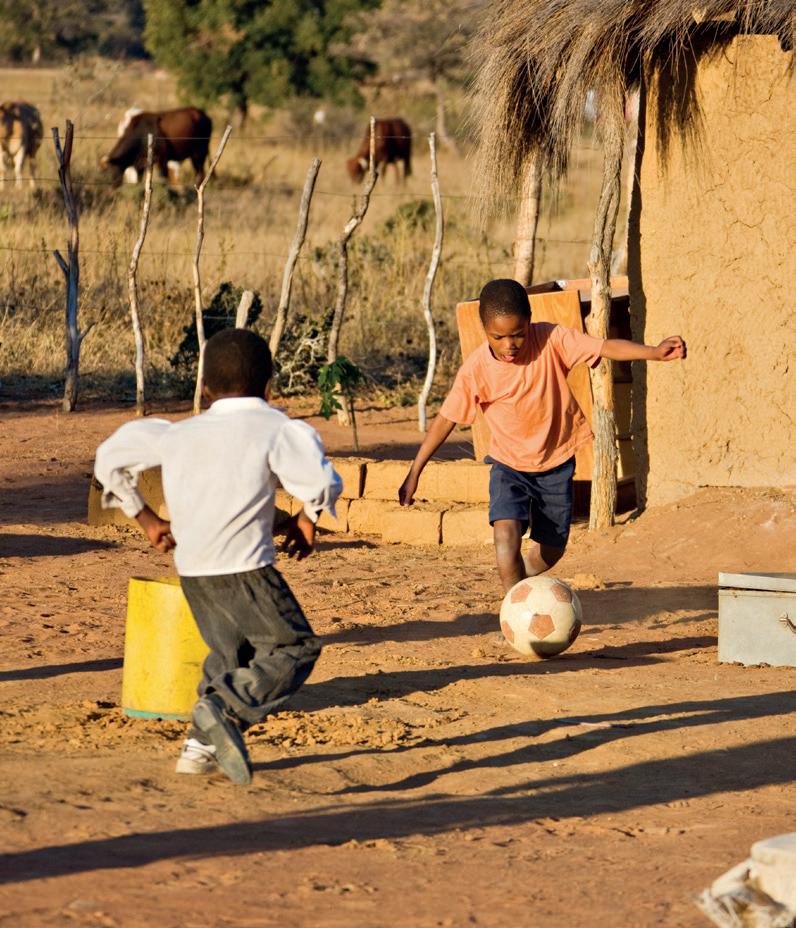
42 • 2019/2020 • IBCR ANNUAL REPORT
© 123RF / Lucian Coman
PRODEF project summary (Since
2015)
110 volunteer missions including 41 IBCR mandates
Shared information on human rights with 9,207 people, including 5,194 women and girls
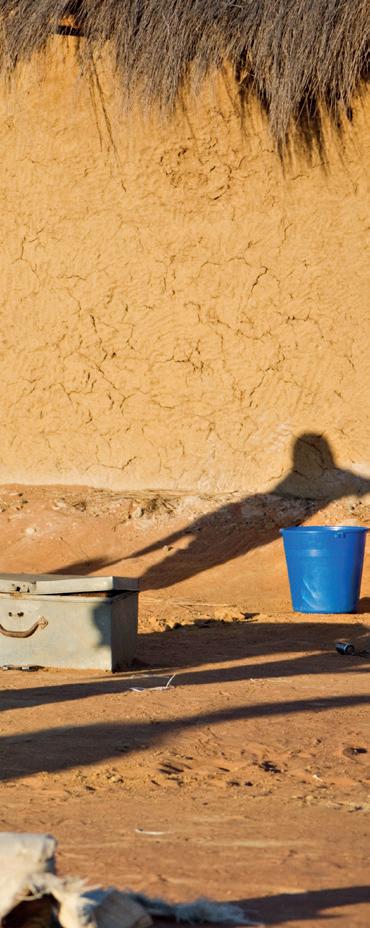
9 countries 28 partner organisations
Improved human rights protection for
24,906 people including 17,221 children and 4,128 women
thanks to volunteers’ support
Ensured better legal representation for more than
4,186 victims of human rights violations, including 2,126 women and girls Brought before the courts more than
300 cases of serious human rights violations (disappearances, human trafficking, genocide, sexual violence, etc.)
Prepared 31 legislative proposals in favour of the rights of children, adolescents and women
Organised more than 350 workshops
Provided training to more than
1,800 people, including 858 women, within partner organisations
2019/2020 • IBCR ANNUAL REPORT • 43
COSTA RICA
OUR PARTNER: FUNDACIÓN PANIAMOR

Provided information on online child sexual exploitation prevention and protection to more than 70 people from vulnerable communities
Supported advocacy efforts on legislation in favour of children’s rights by analysing legislation on inappropriate relationships, child marriage and child victims of sexual crimes
Collected 154 statements from young girls participating in a partner programmes and documented improvements in their living conditions in order to formulate recommendations on the project’s next steps
I’m hopeful that Paniamor will find our findings and recommendations useful for shaping their future efforts.
Organisations like ours always aspire to do a lot, despite having small teams. Having access to skilled volunteers is tremendously helpful. […] In addition, gaining an outside perspective enriches our work and allows us to improve.
- Representative from the Paniamor Foundation, our partner in Costa Rica
44 • 2019/2020 • IBCR ANNUAL REPORT
- Volunteer in Costa Rica
Celebration for young volunteers contributing to the Trayectoras Juveniles project, San José, Costa Rica
CÔTE D’IVOIRE
OUR PARTNER: ASSOCIATION OF WOMEN LAWYERS OF CÔTE D’IVOIRE (AFJCI)
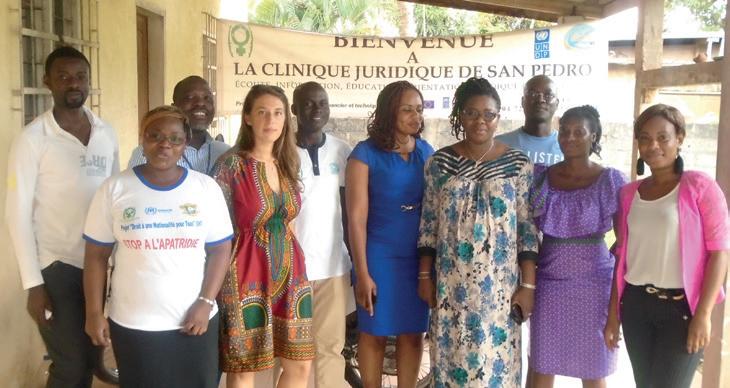
Provided information on child and family rights to 455 people (workers from NGOs, social services, the justice system, security forces and association members) to ensure the recognition of these rights and to support the emancipation of women
Provided child-rights training to 24 teachers in training to help create safer school environments for Iocal children
Reinforced our partner’s knowledge of child rights
In almost two years, I have seen and accomplished many things, but my most cherished memories are of the times we shared and the relationships we formed.
When I first arrived, many of the staff had heard about the principle of the best interest of the child, but they were unable to define it. Later, when we held awareness-building and training activities, I noticed that they were suddenly able to explain the concept to others and apply it in childcare situations.
- Volunteer in Côte d’Ivoire
2019/2020 • IBCR ANNUAL REPORT • 45
Volunteer attends the San Pedro legal clinic, Côte d’Ivoire
GUATEMALA
OUR PARTNERS: MIRIAM ASSOCIATION & NATIONAL COMMISSION FOR THE FIGHT AGAINST CHILD ABUSE (CONACMI)
Provided support for an internal organisational assessment, prepared an institutional handbook, and developed a plan for communicating with partners
Defined regional and national strategic plans to advocate for new initiatives to defend and promote child rights and indigenous child rights in particular Assisted 36 female members of the Miriam Association with various activities and the development of management tools to strengthen advocacy for children’s rights within Guatemalan institutions
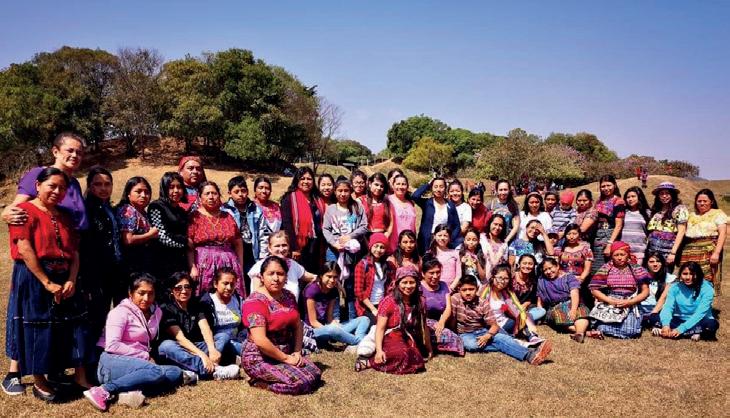
46 • 2019/2020 • IBCR ANNUAL REPORT
Annual activity launch event, Guatemala
MOROCCO
OUR PARTNER: BAYTI ASSOCIATION
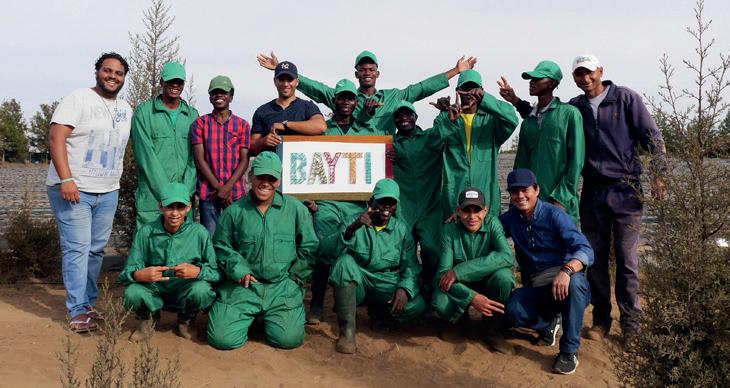
Provided legal support to promote the reunification of unaccompanied minor migrants with their families
Helped draft a bill in favour of placing children deprived of family protection in foster care, which would be in line with international standards, and established an advocacy strategy aimed at initiating dialogue with authorities to support the proposed legislation
Provided information on child rights to 120 children from vulnerable communities
Developed training modules, an interview handbook and a new internal child protection policy, in collaboration with 23 children aged 8 to 17
Implemented a new content strategy and editorial guidelines for the association’s website, focusing on gender equality and women’s rights, and updated the design to increase the site’s visibility
Created two new videos to present the organisation’s work and mission
2019/2020 • IBCR ANNUAL REPORT • 47
Young people living in the Bayti Association’s farm-school, Essaouira, Morocco
Conducted social assessments, analysed the environment surrounding child victims of human trafficking and sexual violence, and established an intervention strategy to ensure the adequate protection of these children
Implemented human trafficking training and awareness-building activities for prevention committees and helped them develop better skills for protecting child victims
Held awareness-building activities on human trafficking, prevention and children’s rights for 700 people, including roughly 450 children
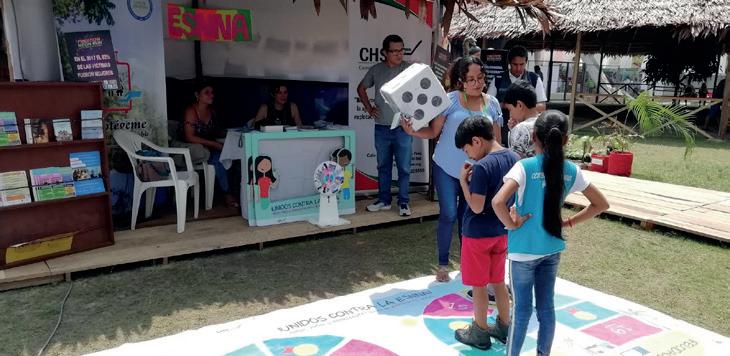
Defined and implemented new organisational policies and procedures on gender equality, including the use of inclusive and non-discriminatory language and the inclusion of women in human trafficking prevention committees
Strengthened the partner organisation’s operations by establishing a communications system, as well as physical and electronic records-keeping within the team
PERU
OUR PARTNER: CHS ALTERNATIVO
I learned a lot, not only in terms of human rights, but also on a personal level. […] I think it is greatly beneficial to the Canadian public. It clarifies and demystifies human trafficking and sexual exploitation […] by explaining how exploitative situations arise.
By sharing their knowledge [on international law], the volunteers helped strengthen the capacities of our team members, who will be able to apply what they’ve learned in current and future cases.
48 • 2019/2020 • IBCR ANNUAL REPORT
- Volunteer in Peru
- Member of CHS Alternativo
Fun and educational activities were held to raise awareness about human trafficking at the CHS Alternativo stand at the Amazon Fair, Iquitos, Peru
TUNISIA
OUR PARTNERS: ADO+ ASSOCIATION & TUNISIAN FORUM FOR YOUTH EMPOWERMENT
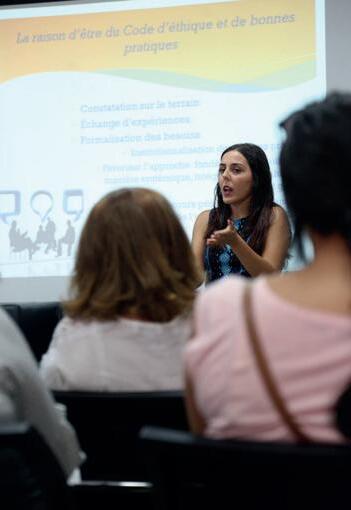
Developed a code of best practices on effectively interacting with children and teens, with input from 22 children
Held awareness-building activities on the United Nations Convention on the Rights of the Child and international law for 55 people
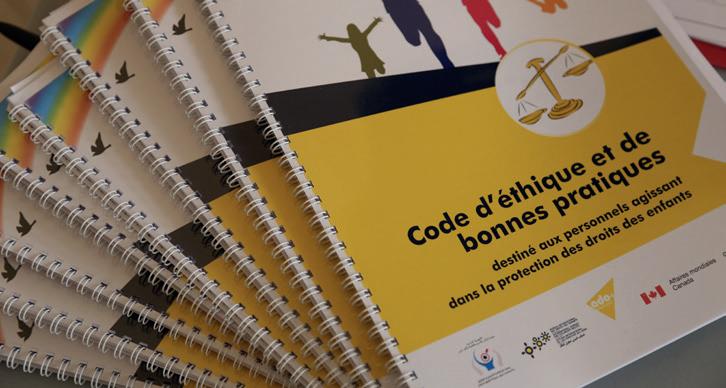
2019/2020 • IBCR ANNUAL REPORT • 49
Consultation with children, Tunis, Tunisia
Code of ethics and best practices for professionals working in the field of child protection
Financial information
The organisation’s complete financial statements as at March 31, 2020 were audited by Deloitte S.E.N.C.R.L./s.r.l. and are available upon request.

© Rawpixel

Government contributions Contributions from international organisations Private-sector contributions and other sources Contributed services 2.7 % 74.2 % 12.3 % 10.8 % Children and the justice system Exploitation and violence against children Children and emergency situations Programme development Administration 53.6 % 19.2 % 11.8 % 13.4 % 2 % REVENUE 2020 2019 Government contributions $4,199,343 $4,705,645 Contributions from international organisations $696,335 $937,867 Contributed services $613,169 $746,125 Private-sector contributions and other sources $153,687 $166,432 TOTAL $5,662,534 $6,556,069 (Deficiency) Excess of revenue over expenses ($65,120) $45,430 EXPENSES 2020 2019 Children and the justice system $3,073,959 $3,716,281 Exploitation and violence against children $1,099,222 $1,689,212 Children and emergency situations $673,916 $441,399 Programme development $114,811 $220,853 Administration $765,746 $442,894 TOTAL $5,727,654 $6,510,639
Our valued partners
The IBCR is deeply grateful to the public partners, local partners and granting agencies whose support allows us to protect more children every year.
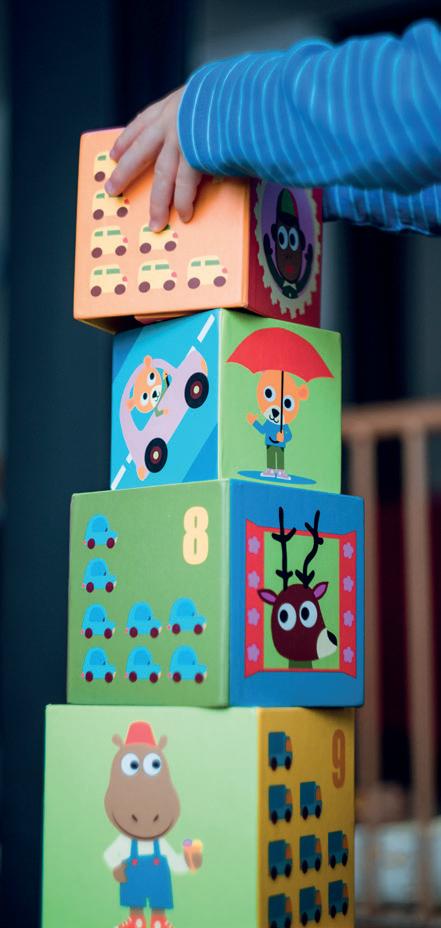
OUR PUBLIC PARTNERS
Global Affairs Canada
United Nations Department of Peacekeeping Operations
Royal Canadian Mounted Police
Quebec Ministry of Justice
Montréal International
International Organisation of La Francophonie UNICEF
OUR PROJECT PARTNERS
Burkina Faso
École le Vivier
Canada
Lawyers Without Borders Canada
Humanitarian Coalition
École primaire Sainte-Cécile
École primaire Saint-Fabien
Equitas – International Center for Human Rights Education
Polytechnique Montréal
And some 40 Canadian civil organisations
Colombia
COALICO
Costa Rica
Fundación Paniamor
52 • 2019/2020 • IBCR ANNUAL REPORT
© Pexels / Markus Spiske
Côte d’Ivoire
Association of Women Lawyers of Côte d’Ivoire
France
Arts et Métiers ParisTech
Guatemala
Ixoqib’ Miriam
National Commission on the Fight Against Child Abuse (CONACMI)
Morocco Bayti Association
Peru
CHS Alternativo
Tunisia
ADO + Amal Association for Families and Children
Tunisian Forum for Youth Empowerment
Worldwide
Alliance for Child Protection in Humanitarian Action
ERDO
Plan International
Terre des hommes
OUR TECHNICAL PARTNERS
Les Béjarts (Democratic Republic of the Congo)
Human After All – HAA (France)
JOVACO (Canada)
OUR SPONSORS
Agence Laval Rive-Nord from iA Financial Group
Deloitte S.E.N.C.R.L./s.r.l.
Galerie 203
OUR DONORS
Every year, we’re honoured to receive generous contributions from a long list of donors. Thanks to you, we remain confident in our ability to continue defending children’s rights. Your unwavering support makes all the difference!
RELIGIOUS COMMUNITIES
Comité central de partage – Les Œuvres Leroyer
Congregation of Notre Dame
Sisters of the Cross
Émilie Jauron Foundation
Marie-François Funds
Missionnaires Oblates de Saint-Boniface
Oblates Franciscaines de Saint-Joseph
Petites Sœurs de la Sainte-Famille
Sisters of Charity of St. Louis
Sisters of Providence of St. Vincent de Paul
Sisters of St. Martha
Sisters of Présentation de Marie
Sisters of Jeanne D’Arc Institute
Sisters of Notre-Dame du Bon-Conseil
Sisters of Notre-Dame du Saint-Rosaire
Sisters of Sainte-Anne
Sisters of Sainte-Croix
Sisters of Saint-Joseph de Saint-Hyacinthe
Ursulines
We would also like to thank those who choose to support our cause anonymously.
2019/2020 • IBCR ANNUAL REPORT • 53
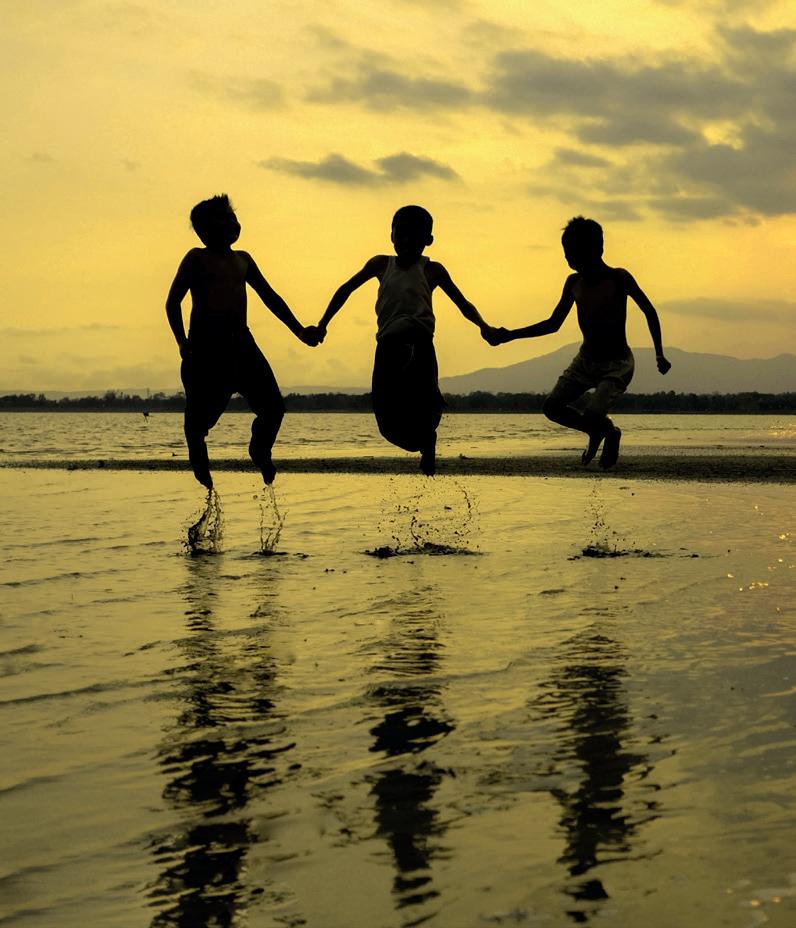
54 • 2019/2020 • IBCR ANNUAL REPORT
YOU TO EVERYONE WHO HAS HELPED US SUPPORT CHILDREN’S RIGHTS.
THANK
© Pexels / Lalu Fatoni
BOARD OF DIRECTORS
Najat Maalla M’jid Chairperson (until May 2019)
Théophane Nikyèma Vice-Chair and then Chairperson (since May 2019)
Emmanuelle Tremblay Vice-Chair (since May 2019)
Jean-Claude Legrand Secretary
Marianne Limoges Treasurer (until September 2019)
Nadja Furth Treasurer (since September 2019)
Denisse Araya Castelli board member
Ghizlane Benjelloun board member
Roberta Cecchetti board member
François Crépeau board member
Joanne Doucet board member
Our team
Cisse Mariama Mohamed board member
Rajae Sbihi, board member (until September 2019)
MANAGEMENT COMMITTEE
Guillaume Landry Director General Yvan Conoir Programme Director
Karla Ponce Administration, Finance and Human Resources Director
Cathy Launay-Alcala Communications and Partnerships Director
The International Bureau for Children’s Rights has also been privileged to have had professionals, interns and volunteers dedicate their time and talent toward the effective implementation of our programmes.
The IBCR would like to thank Najat Maalla M’jid, who acted as Chairperson of the Board until May 2019, for her unwavering support and valuable contribution throughout the past several years. We wish her the best in her new role as the UN Secretary General’s Special Representative on Violence Against Children. We would also like to thank and extend our best wishes to Marianne Limoges and Rajae Sbihi, whose involvement in promoting and protecting children’s rights has been truly remarkable. It has been a privilege to benefit from their expertise.
We wish to warmly thank the entire IBCR team for contributing to this Annual Report.

2019/2020 • IBCR ANNUAL REPORT • 55
HEAD OFFICE
805 Villeray Street, Montréal, (Québec) H2R 1J4 Canada
Tel. + 1 514 932 7656 info@ibcr.org
SATELLITE OFFICES
Democratic Republic of the Congo - Gombe (Kinshasa)
Tel. + 243 89 53 74 184
e.darribere@ibcr.org

Burkina Faso - Ouagadougou
Tel. + 226 25 36 34 59 m.causin@ibcr.org
Honduras - Tegucigalpa
Tel. +504 2203 4730 g.duquemartin@ibcr.org
WWW.IBCR.ORG FOLLOW US ISBN 978-1-989688-11-3 Legal deposit – Bibliothèque et Archives nationales du Québec, 2020

 © Pexels / Porapak Apichodilok
Cover © Pexels / Cottonbro
© Pexels / Porapak Apichodilok
Cover © Pexels / Cottonbro





 Théophane Nikyèma, President of the board
Théophane Nikyèma, President of the board































 Press conference in Kabul (Afghanistan) © Afghanistan’s Ministry of Labour and Social Affairs
u
Press conference in Kabul (Afghanistan) © Afghanistan’s Ministry of Labour and Social Affairs
u



 Study participants aged 17 to 19, Ouagadougou, Burkina Faso, 2013 u
Study participants aged 17 to 19, Ouagadougou, Burkina Faso, 2013 u

































